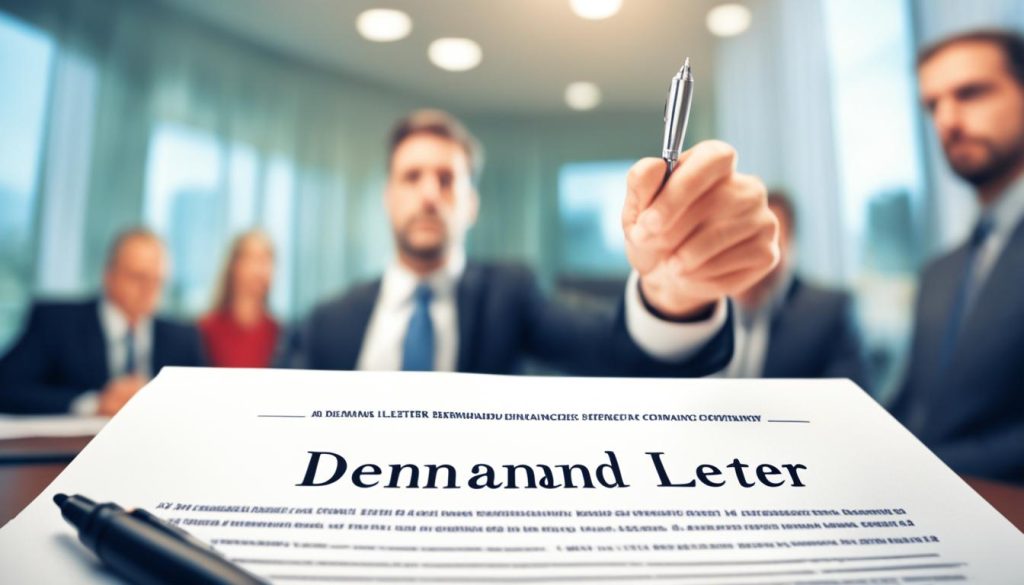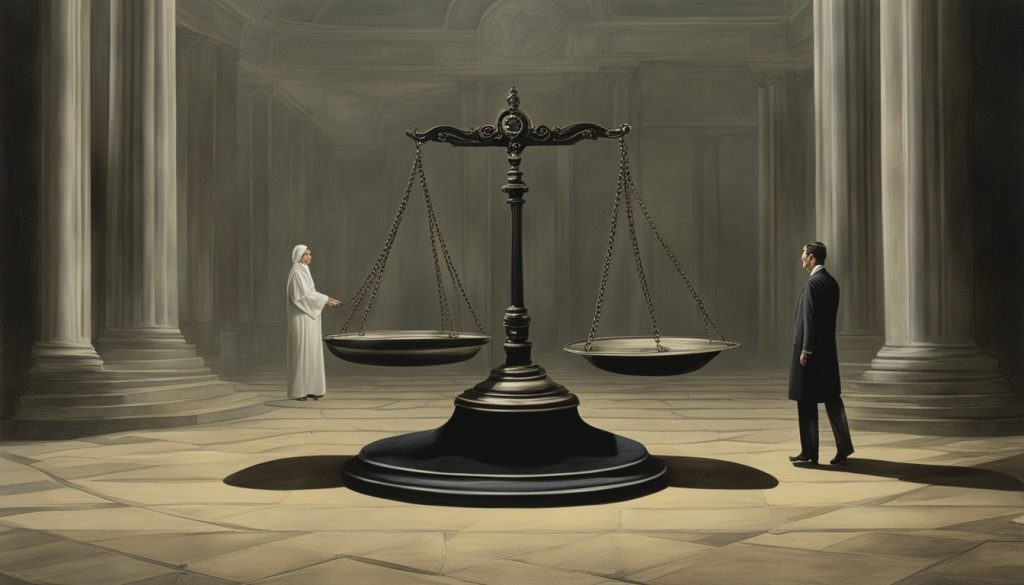Settling your claim doesn’t always mean going to court. Even if your lawyer files a lawsuit, it might not end in a trial1. Most injury claims settle before trial. The goal of settlement talks is to get the most compensation for your injuries1. A skilled personal injury lawyer will work with the insurance company to settle your case fast and fairly.
Key Takeaways
- Out-of-court settlements are a common and preferred approach for resolving personal injury claims.
- Settlement negotiations can often be completed in just a few emails or phone calls with the insurance company.
- A calm and straightforward negotiation approach can help achieve a satisfactory settlement outcome.
- Understanding relevant statutes of limitations is crucial when filing liability claims.
- The collateral source rule and legal precedents like the Howell vs. Hamilton ruling can impact settlement calculations.
- Liability negotiation
- Insurance dispute resolution
Negotiating a Personal Injury Settlement
Many people settle personal injury claims outside of court. The process starts with a demand letter that lists the case details, like injuries and what the claimant wants2. This sets the stage for talks and offers between the injured and the insurance company.
Understanding the Negotiation Process
The insurance company might offer less than the claim is worth at first2. This is a common move to see how much the claimant knows and how patient they are3. Claimants should then offer a bit less than their first ask, showing they’re open to compromise3.
There might be disagreements about the injuries, the accident cause, and policy coverage4. If the injuries are severe or there are future damages, getting a personal injury lawyer to help with negotiations is smart3.
Keys to Successful Injury Claim Negotiation
To get a good settlement, claimants should be ready with evidence like medical records and witness statements3. Emotional stories and visual proof of the accident can also help sway the insurance company3.
Don’t lower your settlement demand without a new offer from the adjuster, or you might lose your bargaining power3. Once you agree on a settlement, make sure to write it down to confirm with the insurance adjuster3.
Negotiating personal injury cases needs strategy, patience, and evidence2. Knowing what affects negotiations and using this knowledge well can help claimants get a fair settlement outside court2.
The Demand Letter and Initial Offer
The first step in a personal injury claim is often the demand letter from your lawyer. This letter shares the case details, including the facts and laws that show the other party’s fault. It also lists your injuries and the damages they caused5. The letter says what settlement amount you’re okay with to close the claim and free the at-fault party from more liability6.
Your lawyer usually sets the initial settlement demand 75% to 100% higher than what you’d really accept6. This gives the insurance company room to offer less6. But, don’t ask for too much, or the adjuster might offer very little, making settlement talks fail6.
After getting the demand letter, the insurance company checks the claim and looks into the facts5. They might send a reply letter about their policy and their right to check the claim more5. Your lawyer will use your case’s strong points, like proving the other party was careless, to ask for a bigger settlement5.
Negotiations often involve many phone calls between your lawyer and the insurance adjuster until they agree on a settlement5. Once settled, the agreement will be written down. It will cover the damages, payment schedule, and other important details57.

Having a skilled personal injury lawyer can greatly affect your negotiation success. They know how insurance companies work and the legal steps5. Their knowledge helps you through the negotiation process and gets you a fair settlement for your injuries and damages.
Evaluating Damages and Injury Severity
The amount you get from a personal injury claim depends on how bad your injuries are and the damages you’ve faced8. The more severe your injuries, the higher your damages will be8. This includes money for ongoing medical care and lost wages8. If you’re seen as partly to blame for the accident, your claim’s value might drop8.
Economic and Non-Economic Damages
You can claim compensation for both economic and non-economic damages in a personal injury case8. Economic damages are the direct costs like medical bills, lost wages, and rehab costs8. Non-economic damages are harder to measure and include pain, emotional distress, and losing out on life’s joys8. It’s key to accurately assess these damages to get the right compensation.
Impact of Injury Severity on Settlement Value
The severity of your injury greatly affects your settlement’s value8. Serious injuries that lead to permanent disabilities or long-term care usually mean higher settlements8. Insurance companies look at your injuries, medical outlook, and life impact to set a fair settlement8. Getting medical help quickly and documenting your injuries well can boost your case and increase your settlement8.
Working with a skilled personal injury lawyer is crucial for evaluating damages and negotiating a fair settlement8. They offer valuable advice on your losses and make sure you get paid for your injuries and their effects on your life8.
settling a claim, out of court settlement, personal injury, negotiation
Settling a personal injury claim out of court can greatly depend on who has the upper hand in negotiations. Key factors can sway the negotiation process9.
Understanding Negotiation Leverage
The strength of the personal injury case is a big factor. A strong case with clear evidence of the insurance company’s fault can give the claimant an edge in negotiations10. But, a weaker case might lead to a lower settlement offer11.
The severity of the injuries also matters. Serious injuries with big medical bills and long-term effects can strengthen the claimant’s position. This is because the insurance company might face a bigger payout if it goes to court11. Less severe injuries might lead to a lower settlement offer, as the risk seems smaller.
What insurance coverage is available and its limits also play a role. Having enough insurance coverage gives the claimant more power to negotiate a better deal. But, if policy limits are low, the insurance company might not offer much, fearing they could run out of coverage9.
Timing is crucial too. Filing claims within the legal time frame can give claimants an advantage. The insurance company might settle quickly to dodge a lawsuit10. Waiting too long can make the insurance company less eager to settle well.
Knowing these factors can help personal injury claimants navigate the settlement process better. It can lead to a fair outcome that covers their losses91110.

Responding to Improper Tactics
When dealing with personal injury claims, be ready for insurance adjusters to use tricks to lower your claim’s value12. They might offer very low initial settlements12 or try to get you to settle with another insurer. They could also say you filed your claim too late or that you weren’t really out of pocket for medical bills12.
Common Insurer Negotiation Tactics
An experienced lawyer knows these tricks and can fight for your rights12. Keeping in touch with adjusters can push them towards a fair offer12. Bringing up legal points or new ideas might get you a better offer12. If talks are stuck, talking to an adjuster’s boss might help12. Saying the insurer might be acting in “bad faith” could make them offer more reasonably12.
FAQ
Does recovering the full value of my damages mean I have to go to court?
No, getting the full value of your damages doesn’t mean you must go to court. Even if your lawyer files a lawsuit, it doesn’t always end in a trial. Most injury claims settle without a trial.
What is the purpose of settlement negotiations in personal injury cases?
Settlement negotiations aim to get you the most compensation for your injuries and damages. An experienced lawyer works with the insurance company to settle your case quickly and fairly.
How do settlement negotiations typically begin?
Negotiations start with a demand letter from your lawyer. The insurance company might offer something low at first, but your lawyer will push for a better deal.
What should I be aware of before agreeing to a settlement offer?
Always talk to a lawyer before accepting a settlement offer. You can negotiate for a better deal. Accepting a settlement means you can’t claim more against anyone else.
What types of damages am I entitled to receive compensation for?
You can get compensation for economic and non-economic damages. This includes medical costs, lost income, pain, disabilities, and less enjoyment of life. The more severe your injuries, the more you can claim.
How can the severity of my injuries impact the settlement negotiations?
Serious injuries mean higher damages, like ongoing medical care and lost future income. If the accident was partly your fault, the insurance company might offer less, blaming you for the accident.
What factors can influence the settlement negotiations?
The time limit to file a claim, the seriousness of your injuries, your case strength, and insurance policy limits affect negotiations. If the insurance company thinks they can win in court, they might not offer a fair deal.
How can insurance adjusters try to undervalue my claim?
Adjusters might try to make you settle with another party’s insurance, say you filed too late, or claim you weren’t out of pocket for medical costs. A skilled lawyer knows how to counter these tactics to boost your claim’s value.
Source Links
- How Personal Injury Settlement Negotiation Works
- Understanding Negotiation in Personal Injury Cases
- Tips for Getting the Best Personal Injury Settlement
- Settlement Negotiations in Personal Injury Lawsuits
- Negotiating Process in Personal Injury | Adam S. Kutner, Injury Attorneys
- How Much Should You Ask For in Your Demand Letter?
- How Does a Settlement Agreement Work? | Adam Kutner
- Personal Injury Settlement Negotiation | What You Need To Know?
- Negotiating Process in Personal Injury
- Steps to Settle a Personal Injury Claim: What to Do and Avoid
- Negotiating a Personal Injury Settlement Without a Lawyer
- When Personal Injury Settlement Talks Fail

